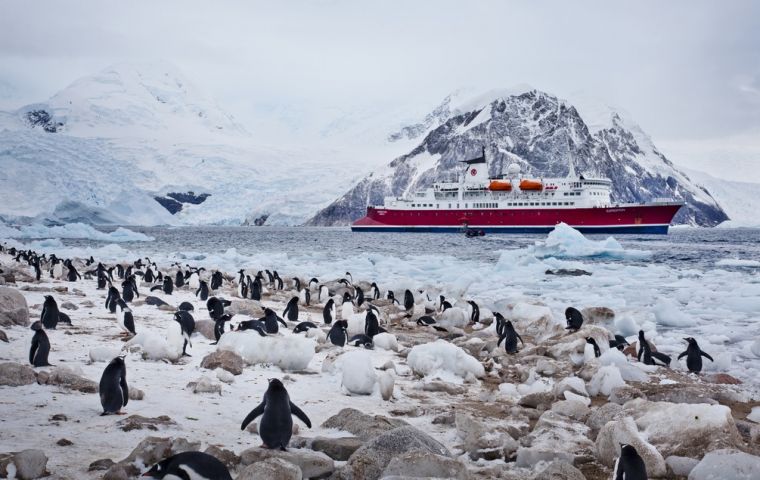MercoPress. South Atlantic News Agency
IAATO Operators redevelop Ship Scheduler process to prepare for tourism growth
 The redevelopment of the IAATO Ship Scheduler will meet increasing vessel and management needs and offer a solution for streamlining vessel to vessel communications.
The redevelopment of the IAATO Ship Scheduler will meet increasing vessel and management needs and offer a solution for streamlining vessel to vessel communications. The International Association of Antarctica Tour Operators (IAATO) is redeveloping its ship scheduling process, as part of its commitment to ‘leave only footprints’ through the effective self-management of guest activities.
IAATO has been carefully monitoring, analyzing and reporting Antarctic tourism trends since 1991. The redevelopment of the ship scheduler process is one of a series of actions that the association is taking to manage for growth. IAATO has also introduced a mandatory observer scheme that will assess all member operators, their vessels and field camps for compliance with IAATO guidelines.
IAATO expects to see 80,553 visitors travel to the white continent with responsible tour operators from its 116-strong membership in 2019-2020, 18,420 of which will be cruise-only visitors, never setting foot on land. Of the remaining 62,133 predicted expeditioners, the majority will depart from South America to experience the Antarctic Peninsula on vessels carrying fewer than 500 passengers including 188 who are anticipated to travel by yacht. 733 will fly to the Antarctic interior with ‘deep-field’ companies.
IAATO has long taken a proactive role in managing pressure on the Antarctic environment so that visitors have no more than a minor or transitory impact. Part of this work involves the annual launch of the IAATO Ship Scheduler, a database which has used IAATO and Antarctic Treaty System requirements to set limits on time, number of passengers allowed, and number of daily visits to visitor sites around the Antarctic coast for almost two decades.
The ship scheduler, which was introduced in the early 2000s, also provides the basis for coordination between IAATO member vessels. Each vessel knows where the others will be and the visits are planned and confirmed well in advance of the start of the season. Each approved Antarctic landing site has a maximum number of ship visits allowed per day and no more than 100 passengers ashore, with a staff to visitor ratio of 1:20.
Mark van der Hulst, IAATO Executive Committee Chair, said: “IAATO is comprised of more than 100 companies with a real passion for Antarctica and an ardent desire to preserve its incredible landscape and wildlife for future generations. Having diligently monitored visitor numbers for many years, we know that numbers have grown. This practice has meant we can recognize trends and patterns season upon season and foresee any challenges or opportunities ahead.
“We have a track record of stringent, proactive self-management and the decisions to review and improve our already robust ship scheduling processes build on that.”
The redevelopment of the IAATO Ship Scheduler will meet increasing vessel and management needs and offer a solution for streamlining vessel to vessel communications. The project was announced on May 3 during IAATO’s annual meeting in Cape Town, South Africa. Every year, IAATO members set aside competitive interests to have open and candid discussions on safety, environmental protection and self-regulation. Decision-making is supported by recommendations developed by IAATO's many dedicated committees and working groups throughout the year. The meetings conclude annually with the voting in of new policies on best practice which support our mission of promoting and advocating safe and environmentally responsible travel to Antarctica.
The scheduler redevelopment joins a host of responsible tourism measures introduced by IAATO during its three-and-a-half day annual meeting, including a unanimous vote to impose mandatory measures to prevent whale strikes in cetacean-rich Antarctic waters, more stringent restrictions on the commercial use of remotely piloted aircraft systems (RPAS), robust adjustments to visitor guidelines for activities on the
Antarctic peninsula; a new code of conduct for vessel operators; implementing a mandatory observer scheme; support for the development of Marine Protected Areas; and approval to expand research into the health of penguin populations at visitor sites. IAATO and its counterpart in the northern hemisphere, the Association for Arctic Expedition Cruise Operators, introduced guidelines that will arm visitors to the polar regions with responsible solutions for reducing their waste and plastic footprint.
Lisa Kelley, IAATO Head of Operations, said: “Our proven success in conscientious visitor management is the result of forward planning based on long-term understanding of the industry. Focused gatherings such as the IAATO annual meeting help us hone our policies and strategies to protect the precious places we visit while enabling those we take to have an enriching, educational experience.
“Work to redevelop the IAATO Ship Scheduler has been underway since last year, beginning with a database upgrade, but our latest full membership meeting was an opportunity to share with our members and polar partners what a more robust, future-proof system could look like.”




Top Comments
Disclaimer & comment rulesCommenting for this story is now closed.
If you have a Facebook account, become a fan and comment on our Facebook Page!